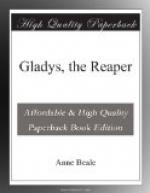’Not Lady Mary! think of my mother! think of me! oh father! father! cruel! this is too much! Say it is not true; only a jest. What have I done? I will be better, kinder, gentler—I will nurse you, tend you—never marry. I would rather not—I never shall. Nobody loves you as well as I. Your only child. My mother’s only child. Say it is not true—oh, say it is not true?’
This was impossible, for Mr Gwynne knew full well that he was pledged beyond recall. But now, as he looked on his daughter, heard her words, thought of her mother, he began to repent of what he had done. He, who hated scenes, dreaded tears, would not annoy Freda for the world, to have raised such emotion! He did not understand it. Lady Mary had assured him Freda would be so glad to be allowed to marry Rowland. And she was so discerning and clever! But he could not bear those sobs.
’Freda! my dear, don’t, I beg, I entreat! You will make me so nervous. You know I cannot bear—in short, I feel quite ill. The fact is, you will make yourself ill, and after all, it need make no difference to you. You will be just the same. Freda, I must beg you to desist. I must insist—I will ring for the housekeeper.’
‘No, no, papa. Do not let us expose ourselves!’ cried Freda, rising suddenly; ’I will go upstairs. Neither you nor I will ever be happy again!’
Freda was about to leave the room, when Mr Gwynne suddenly went up to her, and putting his arm round her neck, whispered, whilst the tears sprang into his eyes,—
’Freda, Freda! my child, forgive me! I didn’t think it would vex you so. I scarcely know how it has all happened.’
Poor Freda threw both her arms around her father, and sobbed again. As she leaned on his shoulder, his white hairs touched the brown glossy braids of her head, and his lips kissed them. At that moment he knew that he did not love Lady Mary Nugent as well as he loved his child, and that child was conscious for the first time how very dear her father was to her.
Again she roused herself, and as if ashamed of her emotion, hastened out of the room. She went upstairs, and locking herself in her room, threw herself on her bed. Here she gave way to feelings that were as new as strange to her, unaccustomed as she was to what some one calls ’the luxury of tears.’ She scarcely knew whether sorrow or anger predominated, but she was wretched and indignant. Tumultuous thoughts rushed through her mind of the past, present, and probable future! thoughts too numerous and changeable to be transcribed, but which may well be imagined.
At last her pride, that one grand feature of her character, got the better of her grief and anger. She rose from her bed, dried her eyes, arranged her hair, and with a carriage as erect as her soul was haughty, once more entered her father’s library. The momentary emotion and pathos of their last embrace had been overpowered in both by stronger sensations; in him by the remembrance of Lady Mary Nugent’s fascinations, in her by the sense of that lady’s tact and duplicity.




